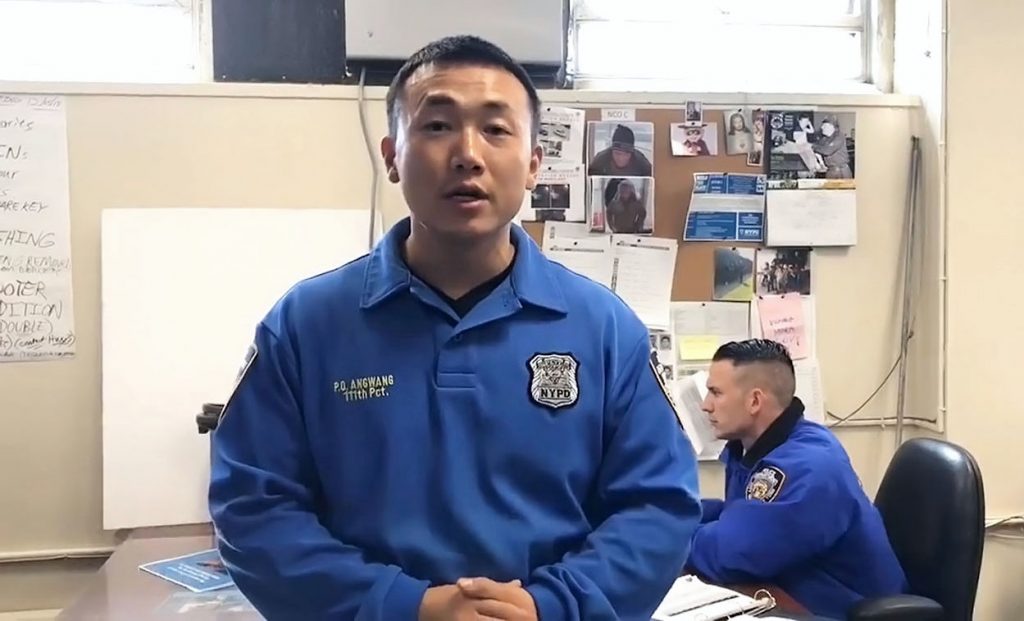Nothing is permanent, so everything is precious. Here’s a selection of some happenings—fleeting or otherwise—in the Buddhist world this week.
Tibetan NYPD Officer Allegedly Spied for China
A Tibetan police officer in New York City has been arrested and accused of spying for China, ABC Eyewitness News reported this week. Born in the People’s Republic of China, 33-year-old Baimadajie Angwang is a community affairs officer in the 111 precinct in New York’s Queens and a US Army Reservist at Fort Dix. He acted “at the direction and control” of Chinese government officials at the consulate in New York to report on the activities of the local Tibetan community, according to the criminal complaint. He also allegedly assessed potential ethnic Tibetan intelligence sources and used his official position at the police department to give consulate officials access to senior NYPD officials. Angwang is also accused of committing wire fraud, making false statements, and obstructing an official proceeding.
Since 2018 Angwang has been “in frequent communication” with an unidentified Chinese consular official he referred to as “Boss,” the FBI said. “Angwang also discussed the utility of developing sources for the PRC government in the local Tibetan community and suggested that the primary qualification for a source as follows: ‘If you’re willing to recognize the motherland, the motherland is willing to assist you with its resources,'” the criminal complaint said. “This is the definition of an insider threat—as alleged, Mr. Angwang operated on behalf of a foreign government; lied to gain his clearance, and used his position as an NYPD police officer to aid the Chinese government’s subversive and illegal attempts to recruit intelligence sources,” FBI Assistant Director of New York William Sweeney Jr. said in a statement.
Buddhist, Muslim Groups Boycott Leh Elections
Buddhist and Muslim organizations and political parties in Leh, Ladakh, have joined together to boycott upcoming elections in their region, India’s Economic Times reported this week. The elections, which are set to take place on October 16, are for the Ladakh Autonomous Hill Development Council (LAHDC), which administers the Leh district of Ladakh, in the Indian region of Jammu and Kashmir. The council was created in 1995, following demands by Ladakhi people to make Leh a new Indian Union Territory because of its cultural and religious differences with the rest of the region. Last year, Ladakh became the first Buddhist-majority region in India, after the Indian government passed a bill revoking Jammu and Kashmir’s special status as an autonomous region and dividing the territory into two Union Territories (UTs), or states: Ladakh, and Jammu and Kashmir. However, Ladakh’s transformation into a distinct UT effectively stripped the region of its legislature, rendering the democratically elected LAHDC powerless, India’s Frontline reports. Now, Ladakhis plans to boycott the council elections until they can get a constitutional safeguard to protect their economic, political, and environmental interests under India’s Sixth Schedule of the Constitution, which makes separate arrangements for what are known as “tribal areas” in India. Ninety-seven percent of people in Ladakh identify as “tribal,” according to Frontline.
Citing Religious Uses, Swastika, New York Votes to Keep Its Name
The town board of Swastika, New York voted unanimously to keep its name, despite the swastika’s connection to Nazi Germany. The town cited the symbol’s prior uses in Hinduism and Buddhism, Newsweek reported. While many people associate the swastika with white supremacy, Jon Douglass, the town supervisor of Black Brook (a small town which includes the unincorporated area “Swastika”), pointed out that Hindu, Buddhist, and Jain religions have used a version of the swastika to represent spirituality. The area was named Swastika by settlers in the 1800s, and even during World War II, residents refused to change the name “just because Hitler tried to tarnish the meaning,” Douglass said.
However, the World Hindu Council of America (VHPA) started an initiative in recent months to argue for differentiating between the swastika used as a “sacred symbol” and the one used by Nazis, which is better known as the Nazi Hakenkreuz. Their statement stressed that identifying the differences between the use of swastikas in religion and the use by white supremacists was important in embracing cultural diversity and promoting interfaith harmony.
Buddhist Center Rebuilds After Arson
Reconstruction of the Columbus Karma Thegsum Choling (KTC) temple in Columbus, Ohio, began on September 8, the Columbus Dispatch reported. The original center was destroyed by arson in 2016. Lama Kathy Wesley, the center’s religious leader, hopes construction will be completed in ten months, she told the Columbus Dispatch. In the meantime, Columbus KTC has been holding services in a nearby synagogue. “This entire experience has shown us the generosity and kindness of the interfaith community,” said Wesley. Columbus KTC has raised over two million dollars for the rebuild, but they will need about $500,000 more to complete the building, according to a GoFundMe campaign raising money for the center. The new structure will be twice the size of the old one and will be able to offer more to the community, including open meditation groups and classes. “We learned when the fire took place that our community is more than a building,” said director Kim Miracle. But she added, “We really want to be together.”
Thank you for subscribing to Tricycle! As a nonprofit, we depend on readers like you to keep Buddhist teachings and practices widely available.
